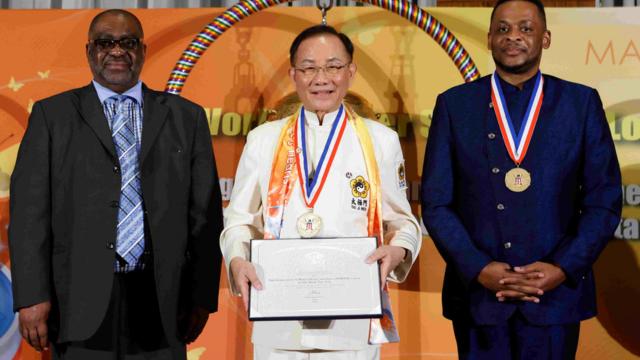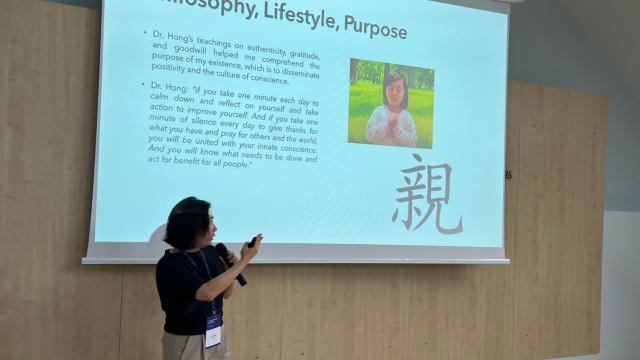Taiwan’s highest authorities praised Tai Ji Men’s activities and teachings. This did not save them from persecution through false accusation and tax harassment.
by Liu Yin-Chun*
*A paper presented at the CESNUR 2023 international conference, Vilnius, Lithuania, June 21, 2023

My background is M.Phil. in Literature, Interculturality, and Slavic Studies. Now I am running a biotechnology company in the Netherlands. I am also a Tai Ji Men dizi (disciple) since I was nine years old. Being a Tai Ji Men dizi inspired me to embark on a journey of self-cultivation and enlightened my life wisdom.
Tai Ji Men is a Taoist-philosophy-based ancient menpai (similar to a school) of qigong, martial arts, and self-cultivation. In 1966, Dr. Hong Tao-Tze founded Tai Ji Men Qigong Academy, where Tai Ji Men dizi, like me, learn how to cultivate our qi (energy) and heart. We also volunteer our time, energy and resources to promote a culture of peace with love and conscience, as well as to safeguard human rights.

Tai Ji Men welcomes international disciples of all religions, including Buddhism, Taoism, Islam, Protestantism, Catholicism, Judaism, and others, which shapes Tai Ji Men’s distinctive worldview. Tai Ji Men believes that all religions are descended from the same source, and our shared beliefs as dizi focus on the primacy of conscience, love, and peace.
Tai Ji Men has guided my lifelong quest for purpose and value. While my work offers financial security and prestige, I came to understand that true happiness lies beyond materialistic desires. Dr. Hong’s teachings on authenticity, gratitude, and goodwill helped me comprehend the purpose of my existence, which is to disseminate positivity and the culture of conscience.
Dr. Hong has taught us: “If you take one minute each day to calm down and reflect on yourself and take action to improve yourself—and if you take one minute of silence every day to give thanks for what you have and pray for others and the world, you will be united with your innate conscience. And you will know what needs to be done, and act for the benefit of all people.”
By putting Dr. Hong’s teachings into practice, I use daily meditation to confront myself and strive for improvement. Despite a challenging career, I consider every obstacle a chance to refine my soul. My true vocation is to inspire my colleagues with positivity and gratitude. Just as Dr. Hong states, the Chinese character for closeness and intimacy, “qin,” implies recognizing each other’s efforts.
This forms part of the life philosophy, belief, and lifestyle that Tai Ji Men has instilled in me, promoting individual growth, peace of mind, and stability for society. Tai Ji Men was praised by Taiwan’s four democratically elected presidents. But what happened, why did the Taiwanese government seize Tai Ji Men’s property, and why is the Tai Ji Men case, which has lasted 27 years, an egregious instance of breaching freedom of religion or belief (FoRB), attracting widespread and worldwide attention?

In his book “The Victim of Truth” (2013), former Taiwanese prosecutor Da Lin recounts the politically motivated crackdown on religious groups after the 1996 presidential election in Taiwan. The ruling party Kuomintang’s (KMT) dissatisfaction with religious and spiritual groups supporting opposition candidates led to a wave of unjust arrests and closures, impacting groups like Fo Guang Shan, Chung Tai Chan Monastery, the group of Master Miao Tian, Tai Ji Men, and others. Some group leaders were arrested and accused of fraud and tax evasion, and religious gathering places were forced to close, although most of the detained leaders were eventually acquitted by the courts. Tai Ji Men did not support any candidate in the 1996 elections but also became a victim of this wave of political purges.
This persecution climaxed in December 1996, when Prosecutor Hou Kuan-jen launched unexpected searches of Tai Ji Men academies and dizi’s homes. Despite a lack of evidence, Dr. Hong, his wife, and two dizi were arrested, and their assets frozen, leaving them devoid of life’s necessities.
In April, 1997, Hou publicly released an ungrounded and far-fetched indictment, where he even accused them of “raising goblins.” He cited a peach wood sword he had seized, a symbol of protection in Taiwanese folklore, as evidence. However, this “evidence” never appeared in court. Hou’s misuse of power, disregard for non-disclosure principles, and intent to defame Tai Ji Men as a “mysterious cult” through media misrepresentation caused significant harm to Tai Ji Men’s public perception. Hou’s mishandling of the case was noted by Taiwan’s Control Yuan, yet, due to political interference, he remained unpunished and was even promoted.
The Supreme Court of Taiwan cleared Tai Ji Men in 2007 and ruled that all defendants in the Tai Ji Men case were innocent, had no outstanding taxes, and had not violated tax laws. The court also recognized that the act of paying respect to the master through a gift was exempt from taxes. Despite this, the National Taxation Bureau ignored the ruling and continued issuing unfounded tax bills. It was only in 2019 that the National Taxation Bureau corrected to zero five of the six years’ tax bills. Still, they maintained the tax bill from 1992 based on a technicality, resulting in 2020 in the unsuccessful and illegal auction and subsequent seizure of Tai Ji Men’s land intended for self-cultivation.
Tai Ji Men’s 27-year ordeal sheds light on how political, legal, and tax chaos can lead to the infringement of spiritual groups’ freedom of thought and belief. The case serves as a reminder of the need for a culture of conscience to overcome what Dr. Hong has warned us against—the “five poisons” of the human heart: greed, anger, ignorance, arrogance, and skepticism.
Despite enduring years of persecution and misunderstanding, Tai Ji Men remains steadfast in its mission to promote world peace. Tai Ji Men Shifu and dizi have traveled throughout the world spreading love and peace through countless cultural performances, summits, and ceremonies.
In 2014, Tai Ji Men together with the UN/NGO Association of World Citizens, and the Federation of World Peace and Love (FOWPAL), launched the Movement of An Era of Conscience. Its declaration states, “The conscience transcends the laws of the world and is the only arbitrator between Heaven and Earth.” This initiative encourages people to uphold their conscience and foster a world of love and peace.
In 2014, the then-president of Latvia, Andris Bērziņš, was the first chief of state to respond. He blessed the Movement of An Era of Conscience, hoping to successfully spread the concept of peace to the whole world, so that everyone might have peace in their hearts. In 2017, under the leadership of Dr. Hong, the FOWPAL Cultural Goodwill Delegation also visited the Baltic States to promote the conscience movement.

Over time, Tai Ji Men has earned numerous international recognitions for its peace-promoting efforts. Most recently, in March this year, Dr. Hong and FOWPAL were awarded the “President’s Lifetime Achievement Award” issued by U.S. President Joe Biden.

In addition to its promotion of conscience, love and peace, Tai Ji Men continues to champion legal and tax justice, and human rights. For example, together with CESNUR and Human Right Without Frontiers (HRWF), Tai Ji Men takes part in fortnightly online forums as well as physical seminars in various countries, calling on the Taiwanese government to rectify its mistakes, discussing legal and tax justice, human rights, and religious freedom from diverse perspectives.
Despite the persistent persecution, Tai Ji Men continues its unyielding quest for justice, human rights, and a culture of love and conscience, striving to embed conscience education deeply into society, enabling sustainable development and peace worldwide. Even dizi of very young age, like my five- and seven-year-old daughters, are part of this mission, spreading kindness and peace among their peers.
Finally, I would like to conclude with the poem “For Whom the Bell Tolls” by 17th-century poet John Donne, which emphasizes how we are all interconnected. Issues faced by religious and spiritual groups often mirror broader societal, human rights, and moral challenges. Only through collective actions, rooted in awakened conscience, can we create a sustainable future.
“No man is an island,
Entire of itself,
Every man is a piece of the continent,
A part of the main.
If a clod be washed away by the sea,
Europe is the less.
As well as if a promontory were.
As well as if a manor of thy friend’s
Or of thine own were:
Any man’s death diminishes me,
Because I am involved in mankind,
And therefore never send to know for whom the bell tolls;
It tolls for thee.”
Source: Bitter Winter

